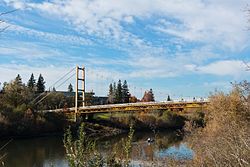Guy West Bridge | |
|---|---|
 Guy West Bridge | |
| Coordinates | 38°33′44″N121°25′14″W / 38.562202°N 121.420510°W |
| Carries | pedestrian and bicycle traffic |
| Crosses | American River |
| Named for | Guy West |
| Owner | City of Sacramento |
| Characteristics | |
| Design | Suspension bridge |
| Total length | 1,144 feet (349 m) |
| Width | 16 feet (4.9 m) |
| Height | 87 feet (27 m) |
| No. of spans | 1 |
| Piers in water | 2 |
| History | |
| Designer | The Spink Corporation |
| Constructed by | A. Teichert & Son |
| Fabrication by | American Bridge Division, United States Steel Corporation |
| Inaugurated | 6 April 1967 |
| Location | |
 Interactive map of Guy West Bridge | |
The Guy West Bridge is a suspension bridge for pedestrian and bicycle traffic spanning the American River in Sacramento in Sacramento County, California, linking the campus of California State University, Sacramento with the neighboring Campus Commons student housing development. It was designed to resemble the Golden Gate Bridge, both in form and signature international orange color.
